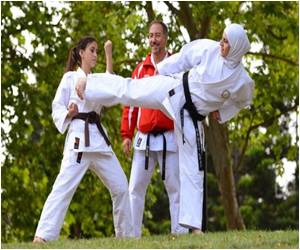More than 200 ninjas gathered at the Tokyo gymnasium to fuel the two-day training seminar, designed particularly for women.

Gone are the days when the Japanese historical masked agents carried out espionage acts against opposing warlords, they said.
Mondern-day ninjas are ordinary people with normal jobs who practise self-defence skills, or "ninjutsu", stressing use of balance and space to bring opponents to submission.
The historical image of a ninja may attract many people, but they soon find the importance of the culture and philosophy behind it, said Sheila Haddad, an American instructor who helped organise the event.
"It's appealing to women because it does not rely on power and strength," she said, adding that many disciples are involved in law enforcement or the military in their countries.
Ninjutsu techniques as well as the ninja philosophy can be applied to real combat settings, said Doreen Montesclaros, 25, a soldier in the New Zealand army.
Advertisement
But ninja ways are more relaxed, she said.
Advertisement
"It helps me realise the greatest weapon that I have. That's my mind and being able to see all the factors that make up situations."
Jinichi Kawakami, the 21st head of the Ban clan, a different line of ninjas that can trace its history back some 500 years, is considered by some to be the last living ninja and has said that "ninjas proper" no longer exist.









